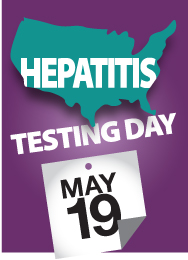Free Screenings for Baby Boomers this Hepatitis Awareness Month
 Did you know that the month of May is actually Hepatitis Awareness Month? Now, we understand that this might not be the sort of thing people want to think about just as we are about to start summer, but it’s actually very important. You see, there are millions of people in our country who are living with some form of hepatitis, and many of them don’t even know it.
Did you know that the month of May is actually Hepatitis Awareness Month? Now, we understand that this might not be the sort of thing people want to think about just as we are about to start summer, but it’s actually very important. You see, there are millions of people in our country who are living with some form of hepatitis, and many of them don’t even know it.
That’s right. These diseases have an uncanny ability to go unnoticed for years or even decades by those who have contracted them. How is this possible? Viruses like the hepatitis C virus (HCV) tend not to produce physically noticeable symptoms (asymptomatic). Actually, some of the most common symptoms associated with hepatitis could be easily confused with the flu.
So why are we telling you all of this scary stuff? Because it’s up to us to take action against hepatitis in order to help prevent further contraction. The primary purpose of Hepatitis Awareness Month is to help inform people in communities all over the country, and to hopefully encourage at least a few people to get proactive about talking to others.
More Baby Boomers Should be Tested for Hepatitis
 One of the goals for this year is to encourage more Baby Boomers to get screened for hepatitis B and C. Not that long ago, the CDC estimated that more than 70 percent of hepatitis cases were made up of people from this generation. It is likely many of these people contracted the virus during the 80’s when rates of contraction were much higher.
One of the goals for this year is to encourage more Baby Boomers to get screened for hepatitis B and C. Not that long ago, the CDC estimated that more than 70 percent of hepatitis cases were made up of people from this generation. It is likely many of these people contracted the virus during the 80’s when rates of contraction were much higher.
This May, health departments in cities from Atlanta all across the country to Anaheim are going to be offering free hepatitis screenings for people who were born between 1945 and 1965. Vaccines are also going to be provided for people in need when they come into their local clinics– although researchers are still developing a vaccine for hepatitis C.
The Impact of Hepatitis C
Healthcare officials would like to continue to educate the public of the devastating impact that these viruses can have when left untreated. Hepatitis C, for instance, goes to work attacking the liver and is the leading cause of liver transplant in the country. Hepatitis-related complications of the liver include:
- Liver cirrhosis (scarring)
- Liver cancer
Clinical research has shown us that the majority of hepatitis A and B cases can improve on their own without medical intervention. However, 85 percent of people who contract HCV will develop a chronic infection which won’t go away on its own.
Luckily, recent advancements in medicine have produced unprecedented cure rates among patients. We won’t lie and say that it won’t completely change your life to be diagnosed with hepatitis C, but there are now very effective treatments available.
Although lab tests are needed to accurately diagnose someone with hepatitis, specialists have identified a common grouping of symptoms that an acute case of viral hepatitis could produce. The following are all indications to be wary of:
- Fatigue
- Flu-like symptoms (sore throat, runny nose, coughing)
- Nausea and vomiting (very common symptoms for hepatitis)
- Fever
- Diarrhea (not as common)
- Constipation (not as common)
- Headaches
- Muscle pain (myalgia)
- Loss of appetite
- Pain in the upper-right abdominal area
- Jaundice (yellowing of the skin or eyes)
- Dark-colored urine
- Light-colored stools
Risk Factors for Hepatitis
The most common forms of viral hepatitis in this country are hepatitis A,B, and C.
- Hepatitis A is transmitted when someone consumes food or water that contains human waste.
- Hepatitis B is contracted when someone comes into direct contact with the bodily fluids or blood of an infected individual.
- Hepatitis C is contracted when someone comes into direct contact with contaminated blood– similar to HBV.
There are several key factors which can put you at risk of contracting viral hepatitis. Please remember that we are not trying to make a judgment call on anyone’s lifestyle, only trying to educate. Studies have shown that most hepatitis cases were contracted while:
- Sharing needles to take drugs
- Getting body piercings or tattoos
- Having unprotected sex with multiple partners
- Receiving a blood transfusion or transplant prior to 1992
(Quick Fact: Women who have hepatitis C do risk passing the disease onto their baby while giving birth.)
We understand that prospect of having an illness like viral hepatitis is scary. However, this is not something that can be simply swept under the rug, forgotten or ignored. If you were born sometime between 1945 and 1965 and you haven’t been tested, we do ask that you at least consider getting screened this May.